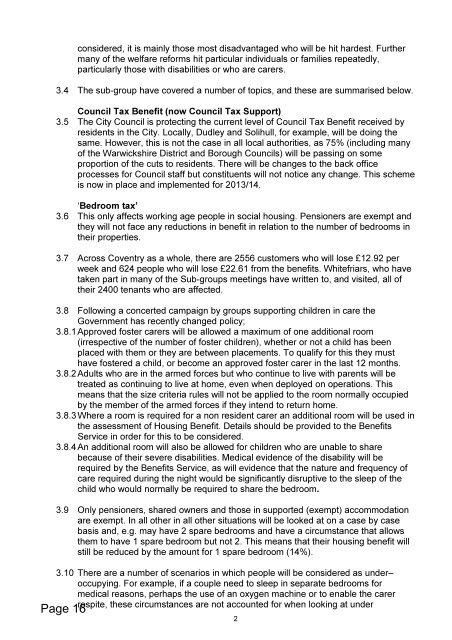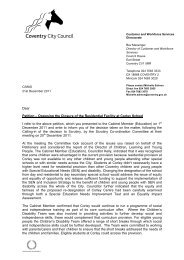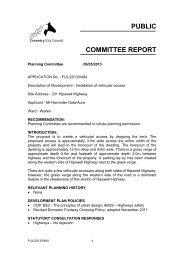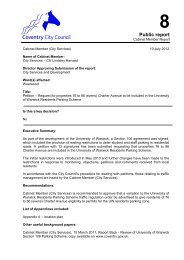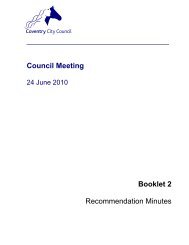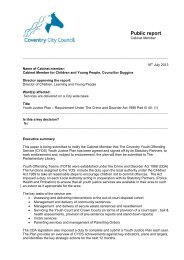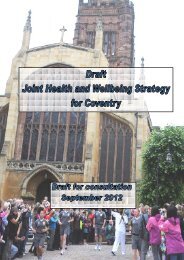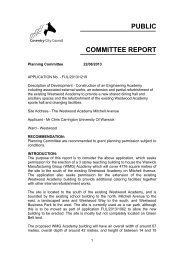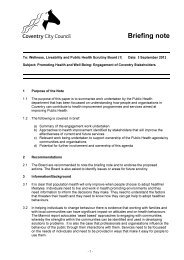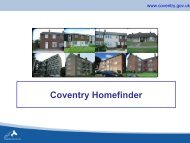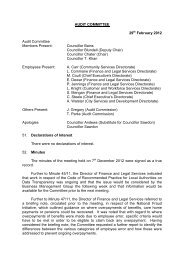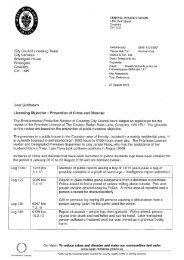Agenda reports pack PDF 347 KB - Meetings, agendas, and minutes
Agenda reports pack PDF 347 KB - Meetings, agendas, and minutes
Agenda reports pack PDF 347 KB - Meetings, agendas, and minutes
Create successful ePaper yourself
Turn your PDF publications into a flip-book with our unique Google optimized e-Paper software.
considered, it is mainly those most disadvantaged who will be hit hardest. Further<br />
many of the welfare reforms hit particular individuals or families repeatedly,<br />
particularly those with disabilities or who are carers.<br />
3.4 The sub-group have covered a number of topics, <strong>and</strong> these are summarised below.<br />
Council Tax Benefit (now Council Tax Support)<br />
3.5 The City Council is protecting the current level of Council Tax Benefit received by<br />
residents in the City. Locally, Dudley <strong>and</strong> Solihull, for example, will be doing the<br />
same. However, this is not the case in all local authorities, as 75% (including many<br />
of the Warwickshire District <strong>and</strong> Borough Councils) will be passing on some<br />
proportion of the cuts to residents. There will be changes to the back office<br />
processes for Council staff but constituents will not notice any change. This scheme<br />
is now in place <strong>and</strong> implemented for 2013/14.<br />
‘Bedroom tax’<br />
3.6 This only affects working age people in social housing. Pensioners are exempt <strong>and</strong><br />
they will not face any reductions in benefit in relation to the number of bedrooms in<br />
their properties.<br />
3.7 Across Coventry as a whole, there are 2556 customers who will lose £12.92 per<br />
week <strong>and</strong> 624 people who will lose £22.61 from the benefits. Whitefriars, who have<br />
taken part in many of the Sub-groups meetings have written to, <strong>and</strong> visited, all of<br />
their 2400 tenants who are affected.<br />
3.8 Following a concerted campaign by groups supporting children in care the<br />
Government has recently changed policy;<br />
3.8.1 Approved foster carers will be allowed a maximum of one additional room<br />
(irrespective of the number of foster children), whether or not a child has been<br />
placed with them or they are between placements. To qualify for this they must<br />
have fostered a child, or become an approved foster carer in the last 12 months.<br />
3.8.2 Adults who are in the armed forces but who continue to live with parents will be<br />
treated as continuing to live at home, even when deployed on operations. This<br />
means that the size criteria rules will not be applied to the room normally occupied<br />
by the member of the armed forces if they intend to return home.<br />
3.8.3 Where a room is required for a non resident carer an additional room will be used in<br />
the assessment of Housing Benefit. Details should be provided to the Benefits<br />
Service in order for this to be considered.<br />
3.8.4 An additional room will also be allowed for children who are unable to share<br />
because of their severe disabilities. Medical evidence of the disability will be<br />
required by the Benefits Service, as will evidence that the nature <strong>and</strong> frequency of<br />
care required during the night would be significantly disruptive to the sleep of the<br />
child who would normally be required to share the bedroom.<br />
3.9 Only pensioners, shared owners <strong>and</strong> those in supported (exempt) accommodation<br />
are exempt. In all other in all other situations will be looked at on a case by case<br />
basis <strong>and</strong>, e.g. may have 2 spare bedrooms <strong>and</strong> have a circumstance that allows<br />
them to have 1 spare bedroom but not 2. This means that their housing benefit will<br />
still be reduced by the amount for 1 spare bedroom (14%).<br />
3.10 There are a number of scenarios in which people will be considered as under–<br />
occupying. For example, if a couple need to sleep in separate bedrooms for<br />
medical reasons, perhaps the use of an oxygen machine or to enable the carer<br />
respite, these circumstances are not accounted for when looking at under<br />
Page 16<br />
2


